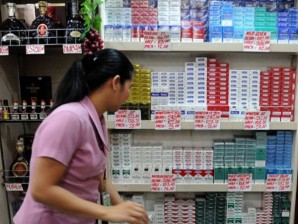Erico Santos, 45, who sells cigarettes under a footbridge on Buendia Avenue in Pasay City, fears the new “sin tax” law that raised the prices of cigarettes may leave him with the short end of the stick, so to speak.
“We are at the end of the line. The manufacturers still earn anyway. But us? We are getting less and less profit from this,” he said, noting that his cigarette sales fell after the sin tax bill was signed into law by President Aquino.
On the streets, cigarettes that used to cost P3 a stick now cost P4. Those who buy cigarettes by the pack will have to pay P3 to P5 more.
Santos himself claims he is in favor of the sin tax law. The prohibitive cost could deter would-be smokers, especially among the youth, he said. He is just worried that he will lose the lifeline of his business—cigarettes by the stick.
On the other hand, 63-year-old Aling Edita who sells cigarettes and candies on the sidewalk on Shaw Boulevard in Mandaluyong City, said pedestrians still buy cigarettes from her despite the additional cost.
She said other vendors had advised her to start carrying lower-priced cigarette brands. She said the tack seems to work because some customers are simply downshifting to cheaper brands.
The real trends have yet to be felt on the street because vendors have hoarded supplies and workers have yet to come back from the holiday break, according to Marlyn Doria who sells cigarettes at the foot of the LRT station on United Nations Avenue in Manila.
“I was able to buy several boxes of cigarettes in anticipation of the price increase and, besides, there are really fewer buyers during this time because of the long vacation, Doria said in Filipino.
“I think we (vendors) will feel its effect on Monday, when things in this area normalize,” Doria said.
Santos said he used to buy a pack of Marlboro cigarettes for P32, now it’s P40; Philip Morris used to cost P36, now it’s P41; Hope jumped from P30 to P32. The per-stick cost will rise accordingly.
The responses from cigarette smokers were also varied.
A block from Edita’s sidewalk spot, call center agent Rai (last names are withheld) said he had already shifted to a brand that sells for only P27 a pack.
His colleague Fred, who also works for a business process outsourcing firm, said he was trying out an electronic cigarette in anticipation of the higher prices of tobacco products.
An e-cigarette is a tube that gives out nicotine-laden vapor instead of smoke from burning tobacco. It costs over P1,000 in some retail outlets.
He said he had been using the gadget for a week, although he and his friends did some “panic buying” of real tobacco products before the sin tax law was signed.
On Jan. 1, the day the new tax rates became effective, Revenue Commissioner Kim Henares issued a notice to manufacturers and importers of tobacco products and alcoholic beverages advising them to get a copy of Revenue Memorandum Circular No. 90-2012, which lays down the new schedule of sin taxes.
Machine-packed cigarettes are now classified into two instead of four tiers—those with a net retail price (NRP) of P11.50 or less per pack, and those selling above that.
Starting Jan. 1, the excise tax on the lower tier will be P12 per pack, an increase of about 340 percent. The excise tax will increase to P17 in 2014, P21 in 2015 and P25 in 2016.
The higher tier will be taxed P25.This will climb to P27 in 2014, P28 in 2015 and P29 in 2016.
By 2017, the price tier system will be dropped and the excise taxes will be P30 per pack on all brands. With reports from Nancy C. Carvajal and Tina G. Santos
